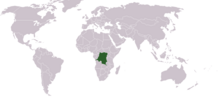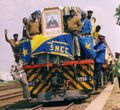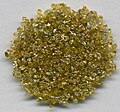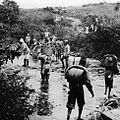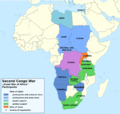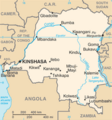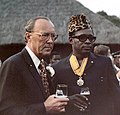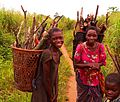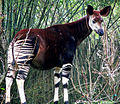Portal:Democratic Republic of the Congo
The Democratic Republic of the Congo Portal
The Democratic Republic of the Congo (DRC), also known as DR Congo, Congo-Kinshasa, or simply Congo, is a country in Central Africa. By land area the country is the second-largest country in Africa and the 11th-largest in the world. With a population of around 110 million, the Democratic Republic of the Congo is the most populous Francophone country in the world. The national capital and largest city is Kinshasa, which is also the economic center. The country is bordered by the Republic of the Congo, Central African Republic, South Sudan, Uganda, Rwanda, Burundi, Tanzania (across Lake Tanganyika), Zambia, Angola, the Cabinda exclave of Angola, and the South Atlantic Ocean. Centered on the Congo Basin, the territory of the Congo was first inhabited by Central African foragers around 90,000 years ago and was settled in the Bantu expansion about 3000 to 2000 years ago. In the west, the Kingdom of Kongo ruled around the mouth of the Congo River from the 14th to 19th centuries. In the center and east, the empires of Mwene Muji, Luba, and Lunda ruled from the 15th, 16th, and 17th centuries to the late 19th and early 20th centuries. King Leopold II of Belgium formally acquired rights to the Congo territory from the colonial nations of Europe in 1885 and declared the land his private property, naming it the Congo Free State. From 1885 to 1908, his colonial military forced the local population to produce rubber and committed widespread atrocities. In 1908, Leopold ceded the territory, which thus became a Belgian colony. Congo achieved independence from Belgium on 30 June 1960 and was immediately confronted by a series of secessionist movements, the assassination of Prime Minister Patrice Lumumba, and the seizure of power by Mobutu Sese Seko in a 1965 coup d'état. Mobutu renamed the country Zaire in 1971 and imposed a harsh personalist dictatorship until his overthrow in 1997 by the First Congo War. The country then had its name changed back and was confronted by the Second Congo War from 1998 to 2003, which resulted in the deaths of 5.4 million people and the assassination of President Laurent-Désiré Kabila. The war ended under President Joseph Kabila, who governed the country from 2001 to 2019 and under whom human rights in the country remained poor and included frequent abuses such as forced disappearances, torture, arbitrary imprisonment and restrictions on civil liberties. Following the 2018 general election, in the country's first peaceful transition of power since independence, Kabila was succeeded as president in a highly contentious election won by Félix Tshisekedi, who has served as president since. Since 2015, eastern Congo has been the site of an ongoing military conflict. The Democratic Republic of the Congo is extremely rich in natural resources but has suffered from political instability, a lack of infrastructure, corruption, and centuries of both commercial and colonial extraction and exploitation, followed by more than 60 years of independence, with little widespread development. Besides the capital Kinshasa, the two next largest cities, Lubumbashi and Mbuji-Mayi, are both mining communities. The DRC's largest export is raw minerals, with China accepting over 50% of its exports in 2019. In 2021, DR Congo's level of human development was ranked 179th out of 191 countries by the Human Development Index and is classed as a least developed country by the UN. As of 2018[update], following two decades of various civil wars and continued internal conflicts, around 600,000 Congolese refugees were still living in neighbouring countries. Two million children risk starvation, and the fighting has displaced 4.5 million people. The country is a member of the United Nations, Non-Aligned Movement, African Union, COMESA, Southern African Development Community, Organisation Internationale de la Francophonie, and Economic Community of Central African States. (Full article...) Selected article -Trésor Lomana LuaLua (/ˈtrɛzɔːr ləˈmɑːnə luˌɑːluˈɑː/; born 28 December 1980) is a Congolese professional footballer who played as a striker. He is currently the attacking coach for Spalding United. LuaLua was born in Kinshasa, but moved to England at a young age. After impressing in a college football match, he signed for Colchester United. There he scored a total of 21 goals in 68 appearances, which prompted Newcastle United to sign him. However, the competition for places meant he was less of a regular in the first team, and after four seasons and 88 appearances he transferred to Portsmouth, where he had previously been on loan for three months from Newcastle. He remained there for three seasons, but his spell was marred by disciplinary problems and malaria. After leaving Portsmouth, he moved teams frequently, representing sides in Greece, Qatar, Cyprus and Turkey, in addition to a brief return to English football at Blackpool. LuaLua received his first of 31 international caps in 2002, and scored seven goals in an eleven-year international career. He represented his national team at four Africa Cup of Nations tournaments. (Full article...) General images -The following are images from various Democratic Republic of the Congo-related articles on Wikipedia.
This is a Good article, an article that meets a core set of high editorial standards.
Jean-Chrysostome Weregemere or Weregemere Bingwa Nyalumeke (born 5 September 1919) was a Congolese politician who led a faction of the Centre du Regroupement Africain. He served as Minister of Agriculture in the Congolese government from August 1961 until July 1962 and then as Minister of Justice until December 1962. Weregemere later held prominent positions in parastatals and sat on the central committee of the Mouvement Populaire de la Révolution from 1980 until 1985. Weregemere was born in Kivu Province, Belgian Congo. After studying with various Catholic institutions and taking courses in medicine, he entered the workforce, but frequently ran afoul of the colonial authorities for engaging in political activities. In 1958 he cofounded the Centre du Regroupement Africain (CEREA), a political party. He successfully expanded its influence and became its secretary-general, but continued to face challenges from the Belgian administration. In early 1960 he accused the leadership of CEREA of communist sympathies and created a splinter party. In the Congo's first free elections later that year Weregemere won a seat in the Chamber of Deputies. In August 1961 he was appointed Minister of Agriculture. In July 1962 Prime Minister Cyrille Adoula reorganised his government and Weregemere was made Minister of Justice. The appointment was not well received by the public, and following attempts by the Adoula Government to arrest members of Parliament, Weregemere was removed from his office by a motion of censure in the Chamber in December. (Full article...)
This is a Featured article, which represents some of the best content on English Wikipedia..
Tintin in the Congo (French: Tintin au Congo; French pronunciation: [tɛ̃tɛ̃ o kɔ̃go]) is the second volume of The Adventures of Tintin, the comics series by Belgian comic strip artist Hergé. Commissioned by the conservative Belgian newspaper Le Vingtième Siècle for its children's supplement Le Petit Vingtième, it was serialised weekly from May 1930 to June 1931 before being published in a collected volume by Éditions de Petit Vingtième in 1931. The story tells of young Belgian reporter Tintin and his dog Snowy, who are sent to the Belgian Congo to report on events in the country. Amid various encounters with the native Congolese people and wild animals, Tintin unearths a criminal diamond smuggling operation run by the American gangster Al Capone. Following on from Tintin in the Land of the Soviets and bolstered by publicity stunts, Tintin in the Congo was a commercial success within Belgium and was also serialised in France. Hergé continued The Adventures of Tintin with Tintin in America in 1932, and the series subsequently became a defining part of the Franco-Belgian comics tradition. In 1946, Hergé re-drew and coloured Tintin in the Congo in his distinctive ligne-claire style for republication by Casterman, with further alterations made at the request of his Scandinavian publisher for a 1975 edition. (Full article...)
WikiProjectsTopicsCategoriesRelated portalsAssociated WikimediaThe following Wikimedia Foundation sister projects provide more on this subject:
Discover Wikipedia using portals | ||||||||



